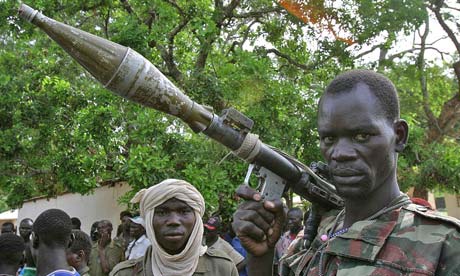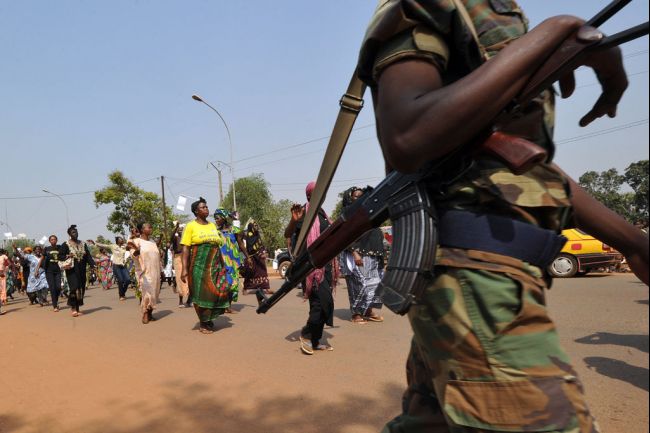One of the most brutal genocides of all time, millions brutally butchered in the streets. But at the time, no one cared too much about Rwanda. The world turned the other way, none too interested in the crisis in the heart of Africa. Are we about to make the same mistake twice?
The Central African Republic has, since gaining its independence, fluctuated between brief democratic governments and brutal dictatorships. In March, 2013 we saw yet another transition of power. An alliance of anti-government militias, called the Séléka, seized power in the CAR, deposing the government of former President Bozizé (who had previously seized power in 2003), after a violent coup. On the 25th March, 2013, Michel Djotodia declared himself President.

Whilst it is with great reluctance that religion is mentioned in the discussion of conflict, it seems to be a key factor in the case of the CAR and pivotal in understanding the violence. It is another state that demonstrates that the arbitrary lines drawn on a map at the end of the 19th Century does not make a strong and unified country. There are few people that define themselves in terms of their nationality, instead deriving their identity from their religion and family. Regrettably, religion has long been a source of conflict in the CAR, with a great disparity between Christians, the majority, and Muslims, distinctly in the minority. The current crisis in the CAR is demonstrable of the inherent problems when a state is ruled by a religious minority; the Séléka are an almost exclusively Muslim militia. Whilst the conflict may have initially started as a military-political conflict, the consequences are decidedly sectarian.
It does not help either that the government headed by Djotodia was entirely ineffective at controlling his militias from the beginning of his turn in power. Many regions of the CAR become fiefdoms unto themselves, ruled by Séléka members, often from neighbouring states. This resulted in a brutal rule, with villagers shot, villages burnt to the ground and many Christian families retreating into the Bush to escape the violent rule of the Séléka. But in September, 2013, Djotodia announced that the Séléka had been dissolved, perhaps with the hope of calming unrest. However, the former leader of the Séléka has proved unable to control them, with subsequent attacks being carried out by the now ex-Séléka militia on Christian communities. In response, a number of Christian vigilante militias were formed, called anti-Balaka, to defend and respond to these attacks. In December, violence between the ex-Séléka and anti-Balaka militias escalated to new levels and tt this point, the international community took even greater notice, to the point of taking action. The UN quickly passed a resolution in favour of installing peacekeepers to protect civilians and François Hollande announced France’s determination to act immediately.
As a consequence, France has sent in Peacekeepers to try to reduce the violence and prevent the mass sectarian violence from escalating any further. However, despite their mandate to disarm the militias, they are being largely ineffective, not being allowed to take sides. French peacekeepers have been observed being inactive whilst next to scenes of brutal mutilation of corpses. However, troops from the African Union are being slightly more effective, as part of the UN MISCA resolution, despite being much worse equipped than the French. Soldiers from The Republic of Congo, Burundi and notably Rwanda have become involved, who themselves have experienced violence of a similar nature. The UN mandate permits the MISCA troops to use any force necessary to protect civilians. Approximately 1,200 French troops and 3,500 African troops are on the ground in the Central African Republic, attempting to quell the violence in a country of 4 million.

Following a summit in Chad regarding the escalating violence between Muslims and non-Muslims, President Djotodia has resigned from his post, along with Prime Minister Nicolas Tiengaye, yet this has had little impact on the fighting. Many of the other formed Séléka high-ups have been fleeing the country. In response to the flight of the Séléka, the wrath of the Christians anti-Balaka has turned to the remaining Muslim communities in retribution for their own suffering of the last 10 months. Hundreds of thousands of Muslim families have been fleeing to nearby countries. It is believed that approximately 1 million people have been displaced by the fighting.
Despite all this, chances are this is the first time you’re really hearing anything about this crisis. Why? Well the west doesn’t really care about a poverty stricken, landlocked country in the middle of Africa. France is only getting involved as it’s a mess that they left years a go. There will likely be no widespread international effort to stop the violence. A situation highly reminiscent of Rwanda 20 years ago. It is an unsettling resemblance, yet you would hope that we’ve learnt a few lessons. The resolution passed by the UN is a lot stronger in dealing with the problem, public awareness, despite being largely abysmal, is actually existent and the violence hasn’t escalated to full blown genocide just yet. But the sheer number of displaced people is already a humanitarian crisis and there appears to be no potential end to the fighting. Quite what resolution will solve this problem, we have no idea, but we best hope against hope that it comes soon.

